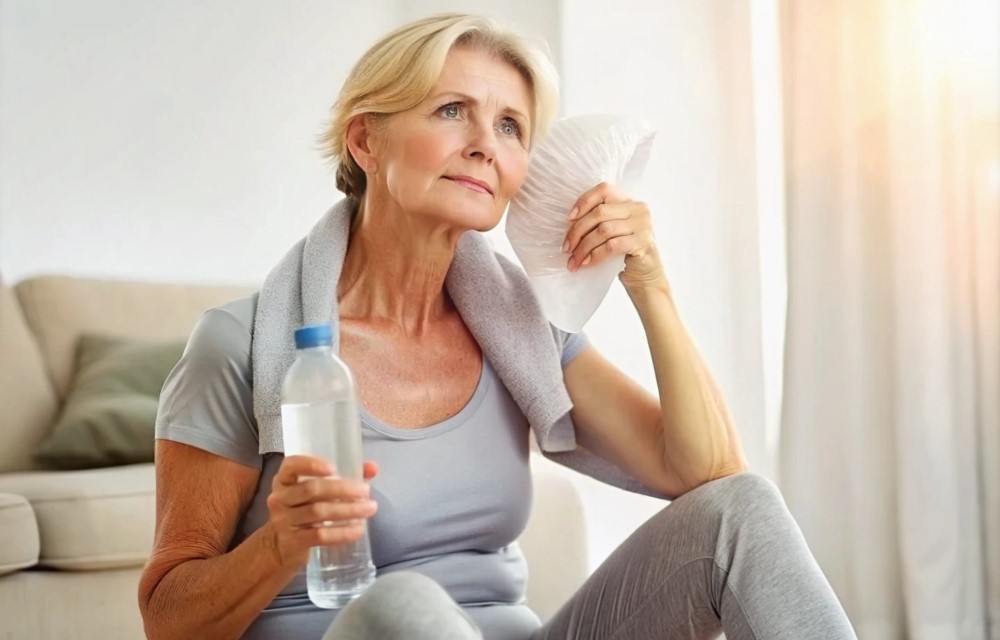What is the average age at which menopause occurs?
If you’re wondering at what age menopause begins, the average age in Spain is around 51 years, although it usually occurs between 45 and 55 years.2
Genetics, lifestyle, and some health factors can cause this stage to occur earlier or later, resulting in early menopause or late menopause.3
What are the stages of menopause, and what are their symptoms?
Menopause is part of a gradual process called climacteric, which represents the transition from the fertile state to the non-reproductive stage.4 This period can extend over several years and manifests differently in each woman.
Premenopause
This happens when ovarian function begins to decline, and therefore the production of oestrogen and progesterone decreases. It usually begins between the ages of 40 and 45.
Symptoms: premenstrual syndrome may be more intense (breast tenderness, headaches, irritability). Cycles remain regular, although somewhat shorter, and ovulation becomes less frequent.1
Perimenopause
It is the transition stage towards menopause, characterised by hormonal changes and alterations in the menstrual cycle. It usually lasts between one and three years and ends when twelve consecutive months have passed without menstruation.
Symptoms: the first hot flushes and night sweats may appear, as well as sleep disturbances, dry skin or vaginal dryness, and mood changes.
Menopause
A woman is considered to have reached menopause when she has gone one year without menstruation since her last period6. It usually occurs between the ages of 45 and 55.
Symptoms: hot flushes, insomnia, mood swings, vaginal dryness, and sleep disturbances are common, as well as headaches, palpitations, or minor urinary leakage.9
Postmenopause
It begins one year after the last period and marks the start of a new stage that lasts for the rest of one’s life.7
Symptoms: they can be similar to those of natural menopause (such as hot flushes, night sweats, or mood swings), and may also include vaginal dryness, weight gain, loss of muscle and bone mass, and sleep disturbances.
At Dexeus Midlife, we offer an online guidance test carried out by our medical team to find out whether you are already in the transition towards menopause or which stage you are at.
What are the effects of menopause according to the age at which it occurs?
Would you like to speak to a team of experts?
You don’t have to go through it alone: we provide you with a specialised team to support you and enhance your quality of life, with an innovative and personalised approach.
The age at which menopause occurs is a determining factor in the intensity of symptoms and in potential long-term health risks.8 When it occurs earlier or later, the duration of oestrogen exposure varies, which can have different effects on the body.
Early menopause: onset before age 45
The ovaries stop functioning earlier than expected and hormone levels drop prematurely. It may be due to genetic, autoimmune, surgical, or cancer treatment factors. Symptoms are usually more intense and longer-lasting, and the risk of osteoporosis and cardiovascular diseases increases, so medical monitoring and specific preventive measures are required.9
Late menopause: onset after age 55
The ovaries remain active for a longer period and symptoms are usually milder. However, prolonged exposure to oestrogen can increase the risk of breast, uterine, or ovarian cancer, so regular gynaecological check-ups are essential for proper monitoring.
How should one deal with early or late menopause?
If menopause arrives earlier or later than expected, medical monitoring is advisable.4 Early menopause requires specific monitoring to alleviate symptoms, protect bone and cardiovascular health, and, if desired, assess fertility options.9
Late menopause usually has a milder course, but it also requires regular check-ups to prevent the effects of prolonged hormonal exposure. In both cases, medical support and healthy habits are essential to maintain well-being.
Expert support and treatments
Menopause is a normal physiological stage that can be experienced with well-being if you have the right information and support.3 At Dexeus Midlife we assess each case individually to offer the most appropriate treatment according to the age, symptoms, and health status of each woman, with the aim of relieving or even resolving the discomforts typical of this stage.1
If you need guidance, have questions, or want to find out which treatment is right for you, you can book an appointment at Dexeus Midlife. Our specialist menopause and gynaecological health team will take care of your physical and emotional health, accompanying you so that you can experience this stage with serenity and quality of life.
References
1 Dexeus Midlife. Gynaecological health: Menopause.
https://www.dexeus.com/midlife/salud-ginecologica/menopausia
2 Dexeus Midlife. When menopause begins and ends.
https://www.dexeus.com/midlife/cuando-empieza-acaba-menopausia/
3 Ministry of Health. Let’s talk about menopause.
https://hablemosdelamenopausia.es/
4 World Health Organization (WHO). Menopause.
https://www.who.int/es/news-room/fact-sheets/detail/menopause
5 Dexeus Mujer. Gynaecological Encyclopaedia: Your life from stage to stage.
https://www.dexeus.com/informacion-de-salud/enciclopedia-ginecologica/tu-vida-etapa-a-etapa/menopausia
6 MedlinePlus. Menopause.
https://medlineplus.gov/spanish/ency/article/000894.htm
7 National Institute on Aging (NIA). Menopause.
https://www.nia.nih.gov/espanol/menopausia/menopausia
8 MedlinePlus Magazine. Menopause: what you need to know.
https://magazine.medlineplus.gov/es/art%C3%ADculo/menopausia-lo-que-usted-necesita-saber
9 Office on Women’s Health (OASH). Early or premature menopause.
https://espanol.womenshealth.gov/menopause/early-or-premature-menopause





